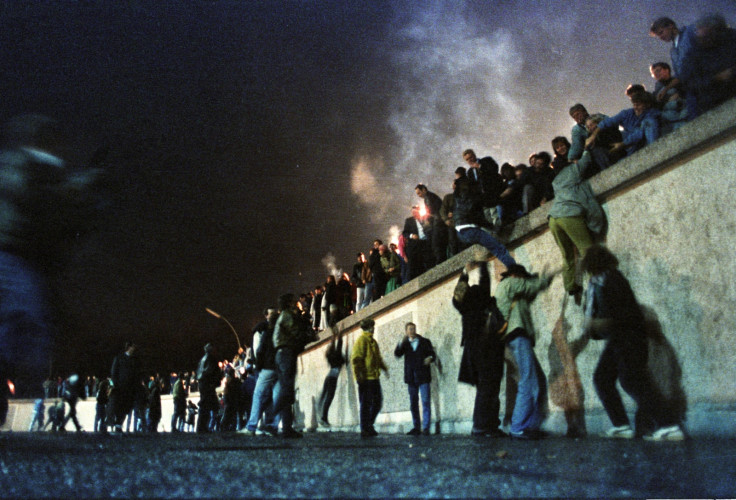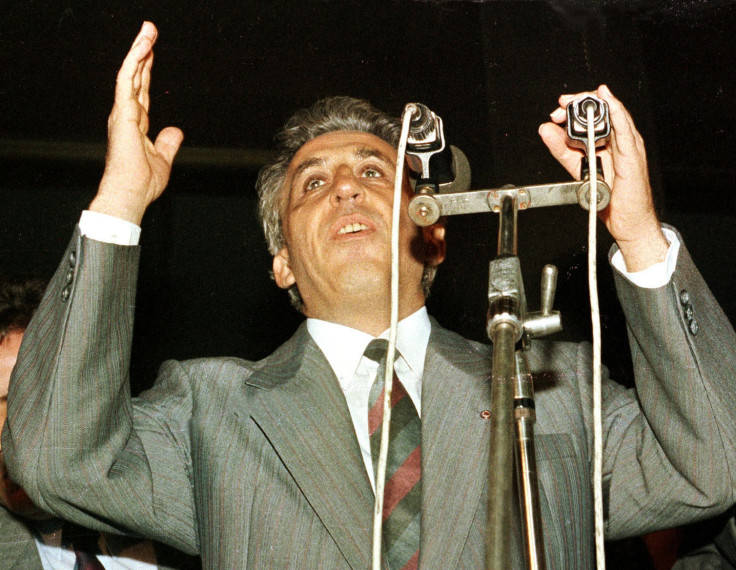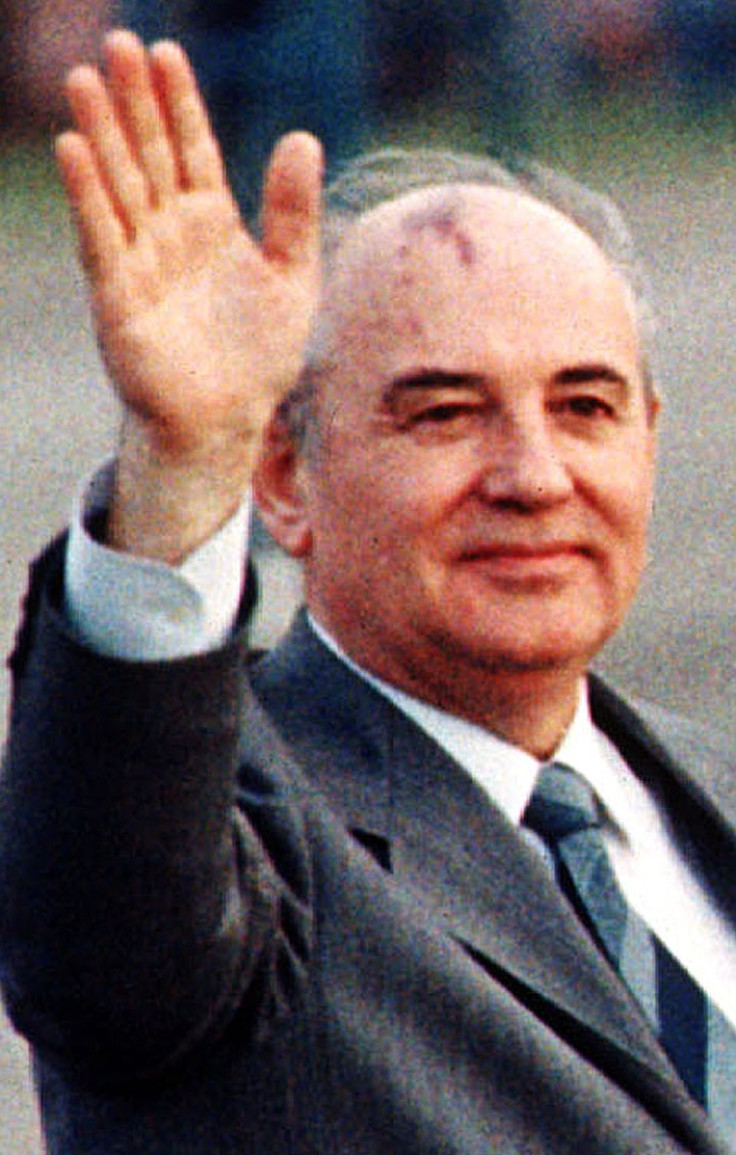Berlin Wall 25th Anniversary: How Mikhail Gorbachev Prevented a Massacre in East Germany

It was the last chance for the German Democratic Republic: tugging in desperation on the fur of its communist grandfather, the Soviet bear, for help.
Egon Krenz, the recently anointed leader of East Germany after his predecessor Erich Honecker was ousted, went to the Kremlin for a meeting with the General Secretary of the Central Committee of the Communist Party of the Soviet Union: Mikhail Gorbachev.
It was 1 November 1989. Krenz carried with him grim warnings for Gorbachev. The East German economy was on the brink of collapse – a fact Honecker had kept hidden from most of his top advisers, as well as his Russian paymasters – and it could no longer pay the interest on its vast debt.
Communism was already crumbling in Poland, Czechoslovakia and Hungary. The latter blew a hole in the Iron Curtain when it opened its border with Austria, over which thousands of East Germans managed to secretly flee to the West.
And, under Gorbachev, Russia was beginning to thaw its Cold War relations with the capitalist West, while drafting plans under the so-called "Sinatra Doctrine" to facilitate the break-up of the Soviet bloc should states decide to do it "My Way".
This was all an existential threat to the GDR, pleaded Krenz. He told Gorbachev that without more financial and military support from the Soviet Union, a state of emergency in East Germany would have to be declared to stop the spread to Berlin of the mass anti-government demonstrations seen in Leipzig.
Drastic action would have to be taken to protect the integrity of the Berlin Wall, the collapse of which was unthinkable to Krenz. He had only just tasted power after being throned in the GDR following years of boot-licking loyalty to the state. This was his time and he was not ready to let go just a fortnight after he had taken over from Honecker.

Gorbachev, who did not like Krenz, was dismissive. Krenz was told it was his responsibility to stop the mass emigration of people from the GDR. This was a family problem, between the out-of-touch authoritarian patriarch state and its people who were full of adolescent optimism.
Krenz would leave without the helpful paw of the Soviet bear, itself suffering a terminal economic and military sickness.
"Soon afterwards, [Gorbachev] issued a reminder to his generals that Soviet troops must not, under any circumstances, become involved in conflicts between the regime in Berlin and East German citizens," wrote the historian and journalist Victor Sebestyen in his book Revolution 1989, a dramatic retelling of the events that led up to and followed the end of the Berlin Wall.
Sebestyen recounts Gorbachev's private comments after the Krenz meeting, as documented in the diary of Anatoly Chernyaev, the Soviet leader's foreign policy adviser.
"This is an absolute priority," Gorbachev is said to have told his aides on the importance of the Soviet Union not intervening militarily in East Germany. "I don't want anything to start there by accident involving our soldiers."
Gorbachev was clear. Violence at the hands of the Soviet Union would be unacceptable. It would undo years of work to warm diplomatic relationships with powerful Western countries and to begin the slow – and still ongoing – process of nuclear disarmament.
"The use of force was out of the question. That was never discussed," Professor Vladislav Zubok, a Cold War expert at the London School of Economics, told IBTimes UK.
"I have found not a single trace of discussion of using military force among the Soviet military back in Moscow, or the general staff in the central committee of the Politburo, or with East Germans. It's just absent entirely."
Glasnost and perestroika
Glasnost (openness) and perestroika (restructuring) were Gorbachev's priorities as he sought to remould the Soviet Union, rather than suppression and destruction. If that meant the bloodless fall of the Berlin Wall, so be it. Though Gorbachev had thought the Wall would take decades to come down.
The Soviet leader used his speech to the United Nations in December 1988 to declare military force should not be used in international relations.

"People said that's rhetoric, that's utopian, that's not real," Zubok said.
His words were soon undermined. In April 1989, 20 anti-Soviet demonstrators were killed and hundreds injured by Soviet troops in Tbilisi, capital of Georgia. Most of the dead were young women. A furious Gorbachev blamed his generals and set up official investigations into the incident.
"There was a unanimous uproar that troops should not be used," Zubok said.
"There is also some evidence that in January/February, internal paperwork was generated between the military, foreign ministry and Gorbachev saying whatever happens in Eastern Europe, we must not use force there, we're not obligated by the Warsaw Pact treaties on anything to use our force there.
"I think it was a realisation on the part of Gorbachev and the people who supported his cause, perestroika, that if you used the military that would be the end of perestroika.
"If you use the military, particularly on a large scale in a foreign country, that would be the end of your foreign policy under perestroika. So of course there was also political rationale, not just humanitarian rationale."
Desperate times for Krenz
In the days before 9 November, Krenz frantically exhausted his political options. He sacked the government and replaced it with a new set of statist officials.
He tried to offer the carrot of a relaxation in travel laws, though they still carried the overbearing bureaucracy of before: new rules would allow citizens to leave the GDR, but only certain people, for a restricted amount of time and after a lengthy application process.
And he promised elections. Except without a plurality of political parties, leaving people to choose between a bland selection of samey communist officials. It was not the change people were demanding.
The one thing Krenz did not do, and could not without the might of the Soviet Union behind him to deter military reactions from West Germany and the US, was start shooting to quell the demonstrations.
Gorbachev's policy of refusing to use force prevented a massacre as the GDR crumbled.
The Berlin Wall falls on 9 November
It was by accident that the Wall fell on 9 November. An announcement by GDR Politburo member Gunter Schabowski at a press conference, about a slight and technical relaxation of the border crossing from East to West, was bungled. Journalists interpreted it as a complete lifting of the travel ban.
Schabowski was asked from when the new travel policy was effective. He had not seen the note saying it would be in place from the following afternoon, nor that this was when the press announcement was embargoed until. So he said immediately.
When the news spread, huge crowds gathered at the Berlin Wall's gates demanding to be let through. There was little the East German state could do now. The Wall was breached as guards let Germans reunite.
"You made the right decision because how could you shoot Germans who walk across the border to meet other Germans," Gorbachev reassured Krenz in the morning after, adding that "the policy had to change".
Tears of joy, not blood, ran through the streets of Berlin. That night, the Wall fell and the world changed.
© Copyright IBTimes 2024. All rights reserved.






